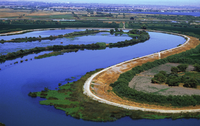-
Southern sea levels rise dramatically
Sea levels have risen about twenty centimeters in the South West Pacific since the late nineteenth century, a new scientific study shows
-
-
Most states in U.S. unprepared for growing water threats to economy, health
Only nine states in the United States have taken comprehensive steps to address their vulnerabilities to the water-related consequences of changes in climate — rainfall events which increase flooding risks to property and health change, and drought conditions which threaten supply for municipalities, agriculture, and industries — while twenty-nine states are unprepared for growing water threats to their economies and public health
-
-
Miniature sensors to advance climate studies, battlefield detection
Self-sealing valves are not only better for collecting reliable climate information – they also increase data reliability for airborne industrial and battlefield gas detection and point-of-contact medicine
-
-
Stormy weather in Europe's future
Europeis likely to be hit by more violent winter storms in the future; a new study into the effects of climate change has found out why
-
-
U.S. Navy experience shows climate alterations
The U.S. Navy reports that because of its worldwide presence, it sees the effects of climate change directly; and expert tells a scientific audience at Sandia Lab that disparities in current climate science projections “mean that the Navy should plan for a range of contingencies, given our limited ability to predict abrupt change or tipping points for potentially irreversible change”
-
-
Researchers use electricity to generate alternative fuel
Scientists show that we can use electricity to power our cars — even if these cars are not electric vehicles; the researchers demonstrated a method for converting carbon dioxide into liquid fuel isobutanol using electricity
-
-
Water scarcity in California's Bay-Delta necessitates “hard decisions”

Simultaneously attaining a reliable water supply for California and protecting and rehabilitating its Bay-Delta ecosystem cannot be realized until better planning can identify how trade-offs between these two goals will be managed when water is limited
-
-
Developing crop for livestock in dry climates
Scientists at the University of Liverpool are working with international partners to develop new forage crop for the hot and dry climate of regions such as Pakistan and Saudi Arabia
-
-
1930s technology to become 21st century tool against CO2 emissions
Human activity releases 30 billion tons of carbon dioxide into the air each year; a new approach to dealing with the problem has a back-to-the-future glint, leveraging technology that the petroleum industry has used since the 1930s to remove carbon dioxide and other impurities from natural gas
-
-
Earth's crust is slowly being destroyed
New research shows that the Earth’s crust is now undergoing high rates of destruction; the research shows the sharp decrease in the growth of the continental crust indicates a dramatic change in the way the Earth has generated and preserved this crust in the last 4.5 billion years
-
-
The Transboundary Agreement is not just about the cost of gas and the environment
The Transboundary Agreement, which the United States and Mexico reached on 20 February, regulates oil and gas development in the Gulf of Mexico; before the agreement is ratified, there is a need to address serious security issues related to building more oil rigs in the Gulf – for example, the fact that the Mexican government cannot control its powerful criminal organizations, and that it will be easy for terrorists in a small boat to overrun one of these deepwater rigs
-
-
Electricity from trees
Plants have long been known as the lungs of the earth, but a new finding has found they may also play a role in electrifying the atmosphere; scientists found the positive and negative ion concentrations in the air were twice as high in heavily wooded areas than in open grassy areas, such as parks
-
-
Confirmed: oil from Deepwater Horizon disaster entered food chain
For months, crude oil gushed into the water at a rate of approximately 53,000 barrels per day; new study confirms that not only did oil affect the ecosystem in the Gulf during the blowout, but it was still entering the food web after the well was capped
-
-
Asteroid to miss Earth next year, but not by much

When it whizzes past Earth in 2013, a newly discovered asteroid is going to miss our planet — but not by much; the 50-meter space rock is expected to come closer than many satellites, highlighting the growing need to keep watch on hazards from above
-
-
Good news: metal-reducing bacteria interacts with plutonium oxide
Studies show that under oxygen-free conditions, plutonium(IV) hydrous oxide, the most common subsurface form of plutonium, does not become very soluble; this information will help in developing effective approaches for isolating and removing the contaminants before they can impact humans and the environment
-
More headlines
The long view
How Climate Change Will Affect Conflict and U.S. Military Operations
“People talk about climate change as a threat multiplier,” said Karen Sudkamp, an associate director of the Infrastructure, Immigration, and Security Operations Program within the RAND Homeland Security Research Division. “But at what point do we need to start talking about the threat multiplier actually becoming a significant threat all its own?”
